#Ballin Mundson
Text

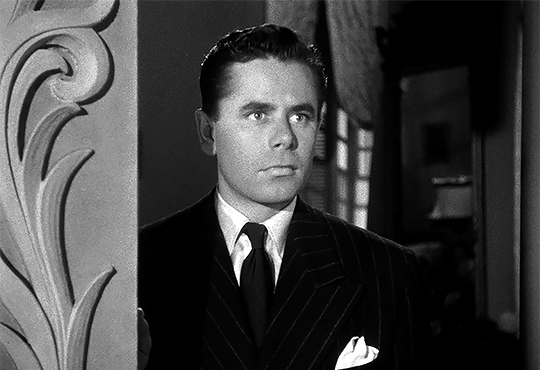

69 notes
·
View notes
Photo


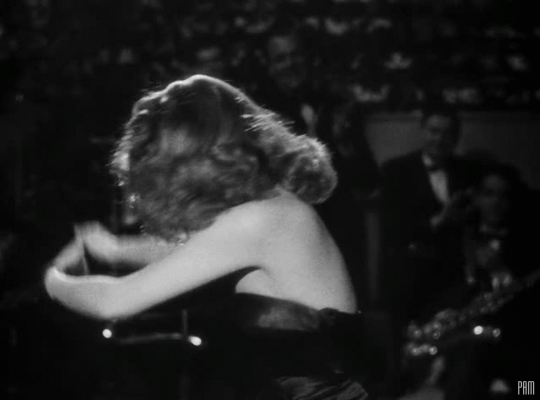
“ Gilda, are you decent?”
“ Me?“
Gilda (1946)
#1946#gif#film#movie#film noir#black and white#Gilda#Rita Hayworth#Glenn Ford#Johnny Farrell#George Macready#Ballin Mundson#Buenos Aires#Argentina#The Shawshank Redemption
89 notes
·
View notes
Text
Back on my Gilda bullshit, I recommend watching it paired with Singin’ In the Rain
They are the complete opposite of each other from a cinematic standpoint and has inverse character dynamics
Gilda: noir thriller centered around a non traditional femme fatale who comes between two male friends
Singin’ in the Rain: musical centered around a Hollywood star who welcomes a third into his relationship with his childhood best friend
#nancy says some stuff#no BECAUSE IVE BEEN REWATCHING GILDA#BALLIN MUNDSON AND JOHNNY FARELL HABE EXPLORED EACH OTHERS BODIES
2 notes
·
View notes
Text




Noirvember 29: Gilda (1946)
"Hate is a very exciting emotion. Haven't you noticed? Very exciting. I hate you too, Johnny. I hate you so much I think I'm going to die from it. Darling…"
Rita Hayworth stole the show as Gilda, a free-spirited woman and former lover of Johnny. Johnny, who's loyal to Gilda's now husband, Ballin Mundson, ends up in a war zone of emotions as he tries to manage the relationship of all three.
3 notes
·
View notes
Note
What are some of your favourite movies?
Thank you for the ask! (Don't take the numbers too seriously)
Midnight Cowboy (1969), dir. John Schlesinger - Joe Buck the Texan dishwasher goes to New York to hustle women but falls for the little scammer Rico Rizzo who offers him a place to stay when he in record-speed becomes homeless.
A New Leaf (1971), dir. Elaine May - Henry Graham, a rich man who has been living a very unsustainable lifestyle, is now broke. He wants to find a wife, kill her and then inheret her wealth. He ends up with Henrietta, a rich, family-less, botanist who is also a big clutz. ROMANCE.
Gilda (1946), dir. Charles Vidor - Johnny Farrell (bad bi rep) goes to Argentina and gets rescued from being mugged by the casino owner and tungston cartel boss Ballin Mundson, and starts working for him. One day Ballin has found himself an American wife, Gilda. Surprise, surprise. She's Johnny's ex. Drama. Amazing. Women's rights, as Johnny and Ballin are peak misogynistic.
The Roaring Twenties (1939), dir. Raoul Walsh - Eddie Bartlett returns home from the war and its rough being a veteran. He ends up working for the mob and then teams up with George Hally (who is >:)) and they go right to the top. There's like a love-gemoetrical shape. Jean Sherman, a performer, likes Lloyd Hart (friend of Eddie who works for him) but Eddie wants Jean. The singer Panama Smith yearns for Eddie. George and Eddie are married and divorced at the same time. Amazing. Love it.
Deadhead Miles (1972), dir. Vernon Zimmerman - Alan Arkin and Paul Benedict drive a truck. That's it. The music is great. The dialogue is interesting.
Harvey (1950), dir. Henry Koster - Elwood P. Dowd, a pleasant man living with his sister, has an invisible rabbit friend. People think he is mentally unwell, and his sister wants him put away. Pleasantness prevails! Long live kindness!
3:10 to Yuma (1957), dir. Delmer Daves - Dan Evans must regain his fatherly masculinity, he thinks, after his sons see him willingly hand their horses over to Ben Wade and his gang of outlaws etc etc. Because there's a drought, the Evans family also needs cash (for their little ranch), and so Dan agrees to help get Ben to prison in Yuma, aka. on the 3:10 train to Yuma. In Contention City, Dan and Ben are in the bridal suite, and Ben being a slut temptress tries to bribe Dan with cash into letting him go while >:) on the bridal bed. Amazing. Iconic.
The Wicker Man (1973), dir. Robin Hardy - Police sergeant Neil Howie goes to Summerisle to find the missing girl Rowan. Everybody there are unchristian sluts to Howie's horror. Unbeknownst to him, he is a fool. Very good.
Real Life (1979), dir. Albert Brooks - A fictional version of Albert Brooks wants to make a movie about real life! He gets himself a family and some scientists to study this thing. The problem is that Brooks is not completely stable and well... what is 'real life' on camera. Amazing! Love it!
Invasion of the Body Snatchers (1978), dir. Philip Kaufman - Aliens are taking over and look just like us. Donald Sutherland and Brooke Adams are so <333333. If you've not seen it, it's kind of fun having seen the 1958 version first (the book isn't all that) so you get the little thing about the man running around all :'0. And, it's a good movie. Both are good.
I have many more. These are the ones I remember now :))) Thank you again :)))
13 notes
·
View notes
Text
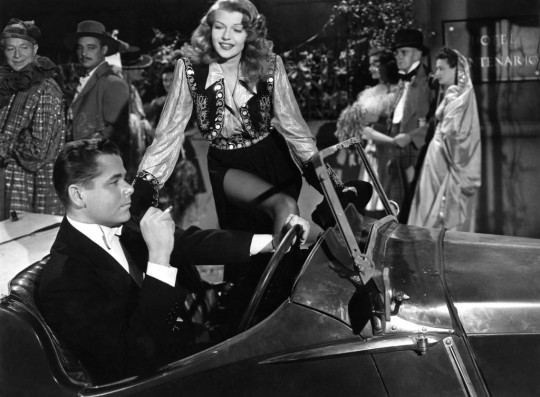
Rita Hayworth and Glenn Ford in "Gilda"(1946)
Just arrived in Argentina, small-time crooked gambler Johnny Farrell is saved from a gunman by sinister Ballin Mundson, who later makes Johnny his right-hand man. But their friendship based on mutual lack of scruples is strained when Mundson returns from a trip with a wife: the supremely desirable Gilda, whom Johnny once knew and learned to hate. The relationship of Johnny and Gilda, a battlefield of warring emotions, becomes even more bizarre after Mundson disappears...
#Gilda#1946#Rita Hayworth#Glenn Ford#film#cinema#classic#old Hollywood#drama#film noir#romance#gambler#casino#Buenos Aires#singer#femme fatal#just watched#40s
5 notes
·
View notes
Text
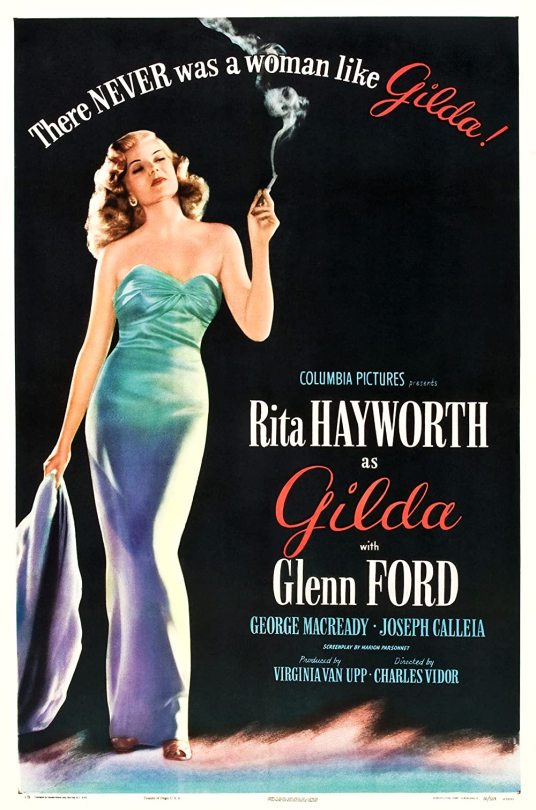
GILDA
Charles Vidor
🇺🇸 1946
Johnny Farrell, un aventurero que vive de hacer trampas en el juego, recala en Buenos Aires. Allí lo saca de un apuro Ballin Mundson, el propietario de un lujoso casino, que acaba haciendo de él su hombre de confianza. Un día, Mundson le presenta a su esposa Gilda. Su sorpresa no tiene límites: fue ella precisamente quien lo convirtió en lo que es: un ser cínico y amargado.
0 notes
Text
Movie Review: Gilda (1946)
Movie Review: Gilda (1946)
Title: Gilda
Release Date: March 14, 1946
Director: Charles Vidor
Production Company: Columbia Pictures
Summary/Review:
An itinerant gambler from America, Johnny Farrell (Glenn Ford), arrives in Argentina where he meets the proprietor of an illegal casino, Ballin Mundson (George Macready). Farrell gains Mundson’s trust and gets hired as a casino manager. A while later, Mundson returns from his…
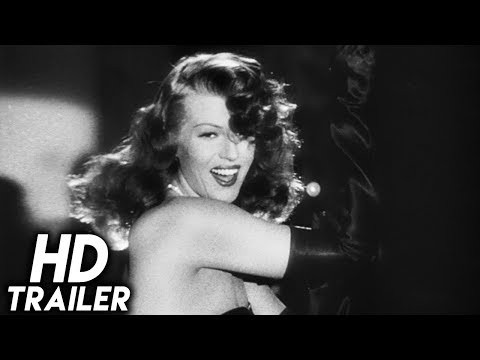
View On WordPress
1 note
·
View note
Text
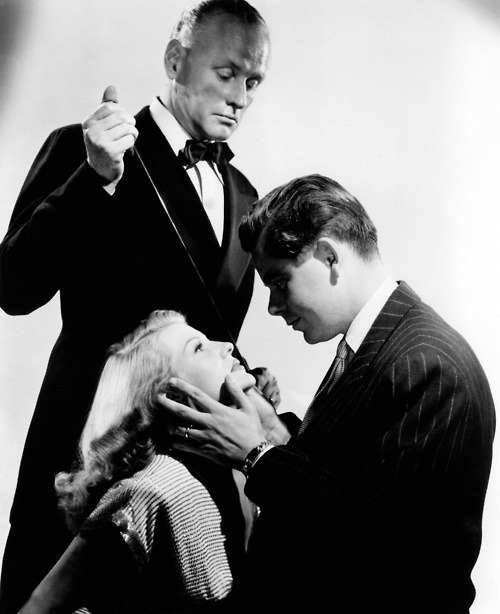
Gilda (1946) dir. Charles Vidor.
7.4/10
This typa smart, smooth talking in the 1940′s is uncommon for me. I vibe with it though.
Talented Mr. Ripley and The Dreamers vibe.
Everything and everyone looks good.
Memorable Quotes:
“Boys have the darndest way of growing up, Ballin. Almost when you’re not looking.”
“Odd things are important to them.”
“A worm’s eye view is so often the true one.”
“Whether you are a gentleman as you say, or a peasant, as I say.”
Spoiler: [About Johnny Farrell, a gambler, who came to Argentina and cheats at craps at the casino. He is being mugged as he leaves and is saved by Ballin Mundson, who stops the thief with a cane that has a sword inside. He tells Johnny about an illegal casino nearby, but to not cheat there. It’s a high class place and Johnny cheats nonetheless. Uncle Pio works in the restroom and refers to him as a peasant. Johnny is brought into the boss’s place for cheating and finds the boss to be Ballin, who hires him as his manager. He becomes Ballin’s right hand man and makes money even though Uncle Pio still thinks of him as a peasant. After awhile, Ballin introduces Johnny to his new wife, Gilda. Ballin believes that Gilda hates Johnny, but assigns him to watch over her. They have dinner together and talk of their relationships. As Ballin heads to business, Gilda goes off to dance with another man despite Johnny not approving of it. Ballin comes back and has Johnny get his wife back. He talks to her later and confronts her on the fact that she knew Johnny from before. She claims that she never knew him even though he sees such hatred between them. A man who wins at Ballin’s casino by cheating is brought in to stop since Ballin no longer wishes to continue business with his people. Farrell is part of the interaction, but doesn’t understand what business Ballin talks of. At this time, Gilda is cavorting with other men and Johnny gets upset. The cheating man tries to kill Ballin at this time, but fails and kills himself in the restroom. Ballin reveals a safe to Johnny and how to access it after he may one day be gone. He explains his involvement in an international monopoly on tungsten. Johnny is sleeping one night and wakes up to Gilda playing guitar and singing to Uncle Pio. He reprimands them and returns her home. They are confronted by Ballin and they claim to have gone swimming together. During a festival, two German mobsters arrive to take back ownership of a tungsten cartel from Ballin since he had it under his name during WWII. The war has ended and Ballin refuses to give it up. One mobster is killed by Ballin at the party and Johnny tries to find Gilda, who has left with another man. They are at home together eventually and he is upset with her until they kiss. Ballin sees it, but rushes away by car to the airport. He flies away and he crashes. It is witnessed by Johnny and Obregon, who was investigating the cartel business. Ballin had made it look like a death since he was saved instead. Johnny opens the safe and takes over the business. He also marries Gilda. Johnny ignores Gilda from then on, but has her tracked down constantly by his men. She is prevented from cavorting with other men. He is treating her this way for the way she treats Ballin. It’s confirmed that Gilda and Johnny have known each other a long time. She escapes to Montevideo and becomes a singer and a dancer. She eventually gets proposed to by a man, who explains the legality of divorce depending on where she is. She has to go back to Argentina to make things official, so they do so. They get to a hotel and Gilda finds Johnny waiting for her and that the proposing man is one of his. Gilda sings at the casino and Johnny drags her away and slaps her after she yells at him. Obregon confronts Johnny and about how the casino will be shut down and how he just wants to know who has signed the papers involving the cartel. He also talks about how Gilda does everything to bother Johnny, but doesn’t mean it. He makes up with Gilda as Ballin reveals himself and how he hadn’t died. He aims to shoot at them and is stabbed by Uncle Pio. Obregon shows up and Johnny says he killed him. Obregon says that Ballin has been dead by suicide, so it doesn’t matter. Johnny hands over the papers.]
4 notes
·
View notes
Text
Gilda (1946): An uncoventional femme fatale
-Isn't it wonderful? Nobody has to apologize, because we were both stinkers, weren't we? Isn't it wonderful?
-Wonderful.
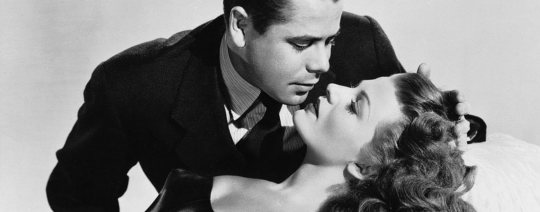
Gilda could be the ultimate example of a film in which a single scene transcends the entire film, making the viewer forget about everything. Some may not have even seen it yet, but they do know of that iconic striptease.
What is film noir without the relationship between the protagonists? What is left in a film noir when we strip it of this element, of those murky and sickly as well as fascinating relationships?
Make no mistake: the sophistication that characterizes film noir would be meaningless without the protagonists. And in this sense, Gilda has its own characteristics, something of a film noir, but with a development in its characters very different from the genre.
Here, the femme fatale doesn’t need a man to lead "to perdition." Her reason for being isn’t that, far from it. Therefore, Gilda breaks with that film noir rule; here the protagonists drag each other in that whirlpool that only brings misfortunes, which is resolved in a totally different way in this film.
One of the characteristics of film noir is that of the love triangle although, in this case, we could speak of two love triangles, one of them very particular. At the beginning of the film, we see Ballin rescue Farrell from the street, from the underworld of Buenos Aires.
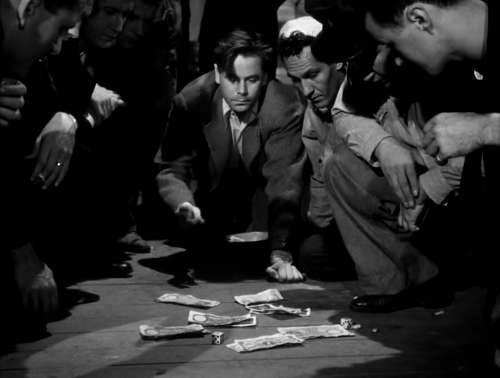
He has saved his life; one feels indebted and the other responsible for the act. Next we see the third component of this triangle, the cane. A cane that hides a a deadly weapon.
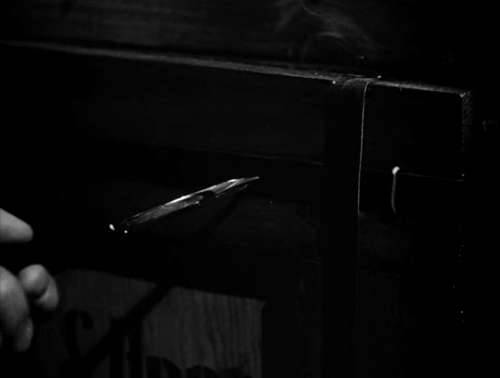
Ballin: It is a most faithful and obedient friend: it is silent when I want it to be silent, but talks when I want it to talk.
Farrell: Is that your idea of a friend?
Ballin: That is my idea of a friend.
It’s not trivial to consider that cane as another member of the relationship between the two men; in fact, when Ballin introduces Gilda, Farrell says: "I thought we were three already”, referring to the cane.
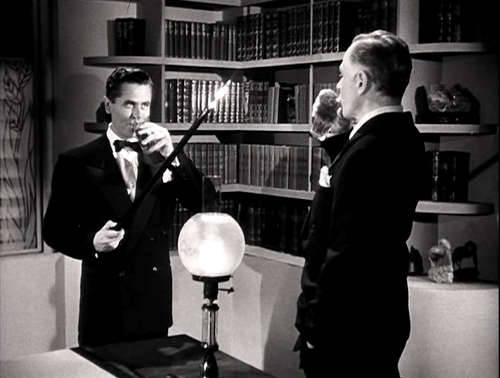
That strange triangle is agreed upon and closed with the following words by Ballin: “This I must be sure of, that there is no woman anywhere. Gambling and women do not mix.” Farrell becomes Ballin's right-hand, his best friend and confidant.
And there it is, the second triangle, and this time, the real one. Ballin appears with his new wife, Gilda, Farrell's old love. As they walk up the stairs, guided by Gilda's siren song, Farrell mumbles an "I hope everything is as before", which sounds more like a wish that he knows won’t be fullfiled; his relationship with Ballin isn’t going to be the same as before. He stands at the bedroom door while we see on his face that he recognises the voice, that voice that he has heard sing so many times in the past.
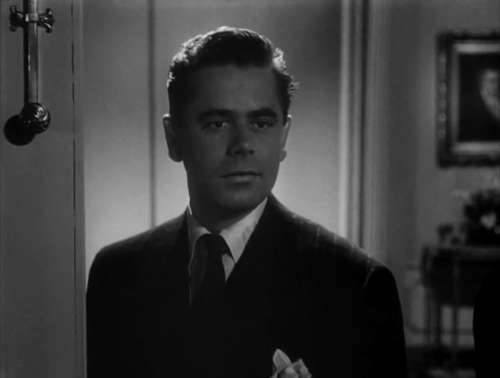
Ballin tells him that "he seems stunned" listening from the doorway.
When Farrell reminds him of the "no women" pact, Ballin replies "my wife is not a woman.” And it is then when Ballin asks Gilda the question:
-Ballin: Are you decent?
-Gilda: Sure I’m decent.
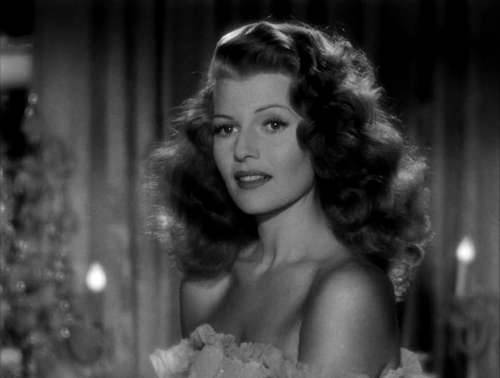
The tension between Gilda and Farrell is evident. We don't know what happened between them (that could be another movie), but the wound there is palpable; Ballin is no stranger to that, he realises it perfectly. The Casino workers notice too, in fact they joke about it. When Ballin asks Gilda not to call him "Mr. Farrell", but Johnny, she says "Johnny is a very difficult name to remember and very easy to forget."
And here that obsessive triangle unfolds, so obsessive that, despite Ballin's suspicions that Johnny and his wife knew each other from before, he asks him to stay near her, to take care of her. It seems to be a game that Ballin enjoy. That macabre game reaches its height during a dinner in which the three share a table, in which they toast the misfortune of the woman who made Johnny suffer:
Ballin Mundson : Now then, before we were interrupted, I believe we were about to drink a toast. So: disaster to the wench who did wrong by our Johnny. No, Gilda? You won't drink to that?
Gilda : Why not? Disaster to the wench!
When Farrell admits to Ballin that they knew each other from before, he says, "I taught her what she knows." Up to that point we can imagine what Johnny has meant in Gilda's life. Thinking that Ballin is dead, Gilda and Johnny get married in a wedding that could predict what comes next: we only see her through a window, through the rain that falls outside.
Johnny begins to punish her by leaving her alone, humiliating her, to such an extent that she has to go see him at the office: “Hello. Do you remember me? I am Gilda, your wife ”. Farrell enjoys humiliating her; He lights her cigarette by placing the lighter at waist height, so she has to "bow" to light the cigarette.
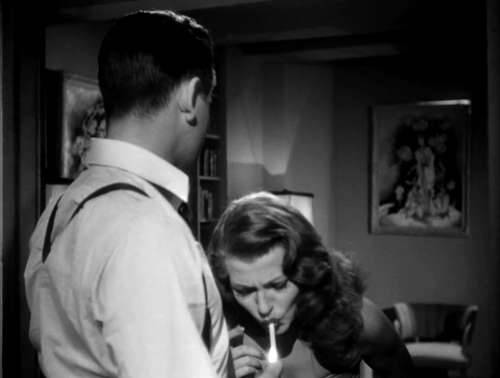
She married Ballin out of revenge on Johnny, and he marries her to humiliate her. So much so, that their new home is dominated by a huge portrait of Ballin. She is a prey to her past. She tries to run away from Johnny, but wherever she tries to go, he torments her.
When everything is over, Gilda surrenders and decides to leave the country; He returns to ask her to leave together, while apologizing for his behavior: “We were both scoundrels. Isn’t it wounderful". That obsessive triangle becomes a couple of neurotics, in which with their strange relationship of emotional dependence., they feed each other until they reach the point of recognising that it’s wonderful that they don’t have to ask for forgiveness or that anyone is guilty of anything, the two have been just as awful.
But Ballin returns from the shadows to claim what is his: his wife.
But prophetically it’s a member of the previous triangle, the knife hidden in the cane, that is going to solve this triangle, and this time forever. Ballin dies at the hand of his best friend,
The tagline for the film announced that "there is no woman like Gilda". There may not be a more iconic female character in film history. She has such strength on screen that perhaps because of that the viewer may not have been able to judge her in depth. She has nothing to do with the rebellious woman we all thought her to, nor is she a man-eater; Gilda is simply different. She is a woman with an apparent happiness, that hides an immense sadness and melancholia.
A woman who complains about "so many people and so much loneliness.” Her need for attention and love is palpable. From the moment she meets Johnny Farrell, The expression on her face changes: the past has returned. When Johnny first goes to the ballroom run by Ballin, he meets a beautiful woman and, when he asks about her they tell him: she is a harpy.
Harpies, fantastic beings with the face of a woman and the body of a bird of prey. In Greek mythology, they were the beings in charge to enforce the punishment of Zeus to Fineo, stealing his food. Later on, various traditions gave them malevolent connotations, carriers of catastrophes.
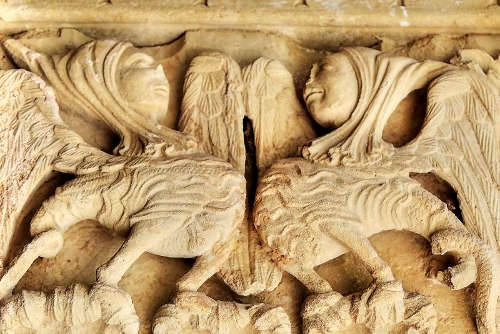
When Ballin appears to be dead, Farrell finds himself between two harpies reading Ballin's will and instructions.
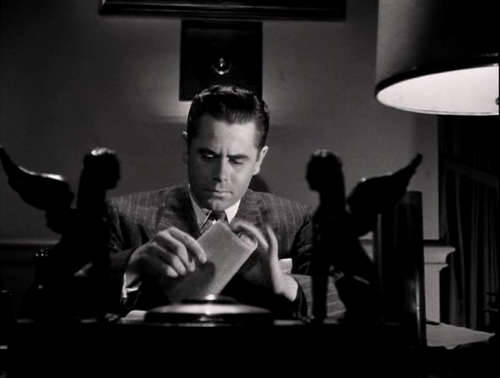
Gilda can’t be considered the classic film noir femme fatale. She seeks to torment Johnny, but in order to make him jealous, her end goal is not money, as is often the case with the film noir woman; She is in love with him, she marries Ballin for money, yes, but it’s a question that Ballin was not oblivious to when he married her; for him she is a beautiful and hungry little girl.
He feels like a man, he realises himself as such by feeding her. But Gilda's wound is very deep; referring to Farrell, she says: "I was once loyal to a man, and look what happened." Ballin justifies her marriage to him: “She said she was born the day she met me. The three of us have no past, only future. Interesting, right?". Those same words are the ones Johnny used when he met Ballin, who had been born the day he met him.
There are two very important themes in Gilda: hatred, hatred that’s been shaped by Gilda’s pain. She reiterates many times how much she hates Johnny, but it’s a simple excuse; She loves him so much that she has had to turn the feeling into hate as a barrier against pain: “Hate can be a very intense emotion (…). Hate is the only thing that warms me. ”
And Farrell in turn thinks about her: “I hated her so much that I couldn't forget her. I was in the air I breathed.” The reunion with Johnny makes her want to plunge into a self-destructive spiral that, that would destroy everything she knows. Her words to Johnny are very significant: "I hate you so much that I would destroy myself to drag you down with me."
But the love game she plays with Johnny reveals something else: She doesn’t hesitate to be seen with other men to arouse his jealousy, a game into which she falls very easily. At the Carnival, with another identity, with a mask, they dance as it seems they did before. She’s mischievous: “I can help you regain practice. I mean dancing. "
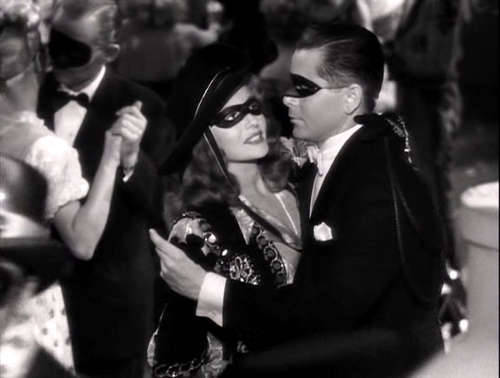
He asks her to throw her hat back. He shoves her away violently while she laughs amused. The love-hate game between them is very powerful. We can’t forget the famous slap that he gives her ... although he doesn’t escape a few himself. The game of erotic power play and violence often present in film noir is very noticeable here.
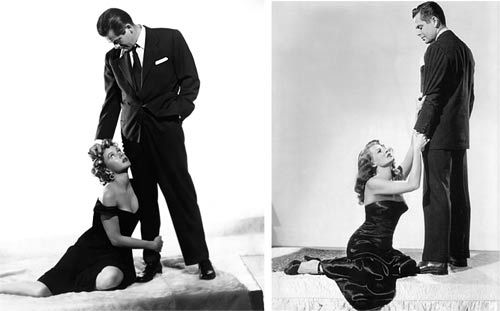
When he takes Gilda home, she does’t hesitate to stress again and again that they are alone. He can’t avoid the temptation and goes up to the bedroom. She has removed her disguise, she is Gilda again, a Gilda in the shadows. They hesitate whether to approach each other or not: "I hate you so much that I think I'm going to die from it ... darling." Their neurotic behaviour could be summed up in this phrase, in that kiss during which the two explode when they say that they hate each other to death.
Gilda’s death drive leads her to an obsessive superstition, another important theme in this film, in which she leaves her life and actions in the hands of that belief, she sees signs everywhere and subjects her life to that destiny. The night the three of them toast to the misfortune that Johnny suffered (herself), she is afraid to drink the glass, as if consuming the champagne closes a pact with the devil.
But after a moment of doubt, she drinks without hesitation, as if that liquid were a poison and she wanted to die right there. She doesn’t care that she’s toasting to her own misfortunes. She’s so superstitious that when she tells the maid, she asks her not to repeat it. Whilst being in luck at roulette someone says "lucky in the game, unlucky in love", and she stops playing to avoid tempting luck. On her wedding day with Johnny, a lonely, sad and glamorousness wedding, a wedding that we as spectators only see through a window, she says: “The rain has stopped. Maybe it means something. ”
Of course Gilda is not the typical film noir woman. She is a tremendously sad woman, sadness caused by love, and who seeks to flee from herself, from everything inside herself.
A woman afraid of her husband and destiny, fearful of life, in a word. In the end, feeling cornered by everyone, the only thing left for her to do is a farewell worthy of her, an iconic dance: She knows she’s being observed by everyone, especially by Johnny. A song in which she asks to blame someone else, "Put the blame on me."
Don't blame Gilda; she’s already fleeing Buenos Aires. But Johnny asks her to go with her. What was Gilda looking for? To be loved. Nothing more, nothing less. Gilda represents the “whore” who wants to emancipate herself to become a mother. Almost no woman in film noir is a mother, a femme fatale is not a mother, she’s a temporary distraction and obstacle to the hero.
But Gilda wants to escape such a condition, and we could really see her as a loving mother and living together with Johnny. In Gilda the woman could be seen as a symptom of the man, Gilda comes to substitute those other symptoms that these men have (sadistic in the case of Ballin, vengeful in the case of Farrell), and take them out on her.
Film noir always plays with appearances: nothing is what it seems to be. But in Gilda, this premise turns to "but in the end everything was what it seemed to be." That game of appearances, like at the Carnival, ends when the participants remove their mask, this time, in a violent way. Neither is Ballin the good Samaritan who saves lives altruistically, nor is his Casino his main activity, not even his death is true. We are shown his shadow on different occasions, in profile; we never see him fully.
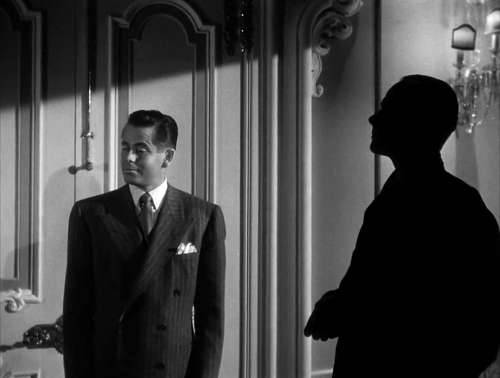
Gilda and Johnny’s life is also a lie, to bear their pain. The Casino is itself a lie, a place that Ballin uses to hide his work, and that he has arranged to be able to see without being seen. His office is upstairs, from where, thanks to a set of lights, blinds and windows, he can see everything, like an omniscient God.
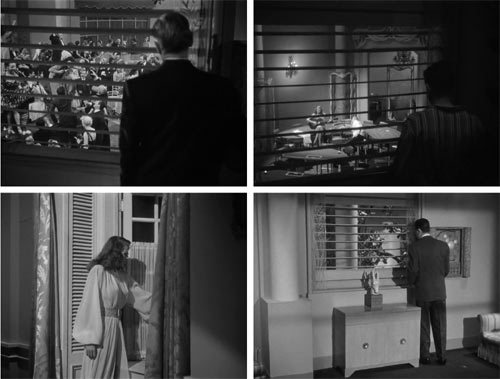
It’s the only way out of the suffocating atmosphere of the game room. Gilda is no stranger to what that game of points of view can provide to her, on two occasions she knows she’s being observed by Johnny, she seeks to be observed by him, but she doesn’t see him watching her, as if he doesn't want to see her face and guess what she’s thinking at the moment. The final moment, Gilda’s iconic dance, seems meticulously prepared for him to observe her, but also for him to see how others look at her. What does Farrell do? He stops her. He can’t stand what’s happening.
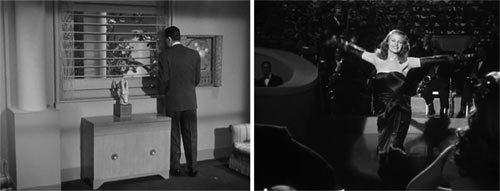
Doesn't that moment remind us of this one from Paris, Texas?
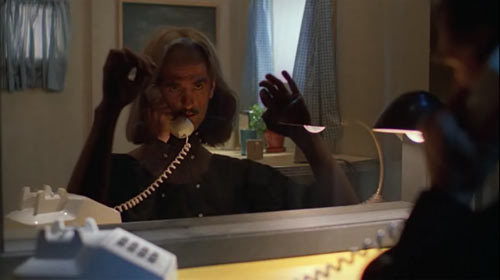
Or this one?
Two absolutely different women, but in a sense mirrors of each Gilda is the whore who wants to emancipate herself to become a mother; Jane is the mother who emancipates herself and becomes a whore, once Travis appears, she takes the path back to that role of mother. Could that moment that game of points of view, be the beginning of that emancipation, of that path?
That claustrophobic environment and that game of viewpoints is exemplified in Gilda and Johnny's wedding: We only see her through a window, through a rain curtain, we don't even hear what is being said inside the room. We are spectators. But aren’t we during the entire film?
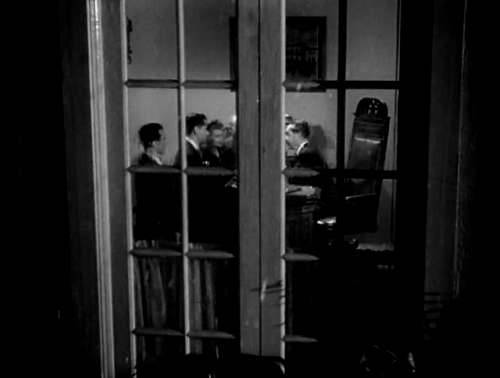
Gilda’s iconic phrase: If I'd been a ranch, they would have named me "The Bar Nothing.", is now more ironic than ever. No, she is not the free woman we were made to believe; she has an owner, Johnny. The mare is back with the stallion.
@purecinema @idasessions @missdubois @mad-prophet-of-the-airwaves
#fave#took me ages to write#gilda#gilda 1946#charles vidor#rita hayworth#glenn ford#film noir#40’s cinema#cinema#movies#films#film review#movie review#movie analysis#film analysis#filmista
55 notes
·
View notes
Text
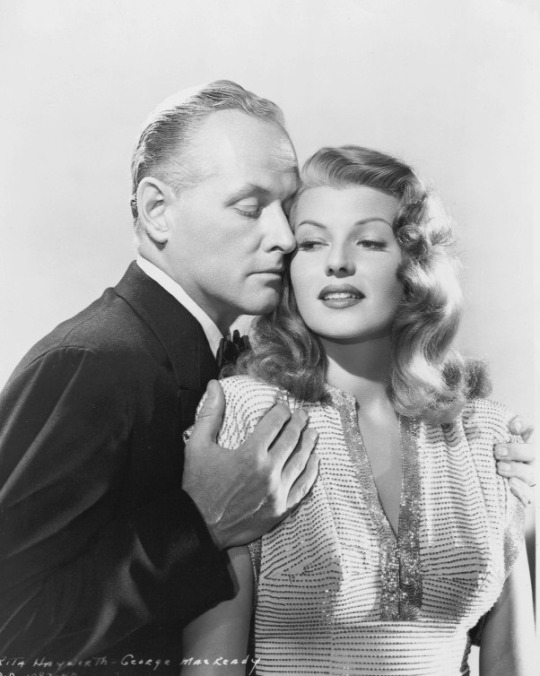
George Macready as the sinister Ballin Mundson with his paws all over Rita Hayworth as the title character in Charles Vidor's GILDA (1946)
25 notes
·
View notes
Text
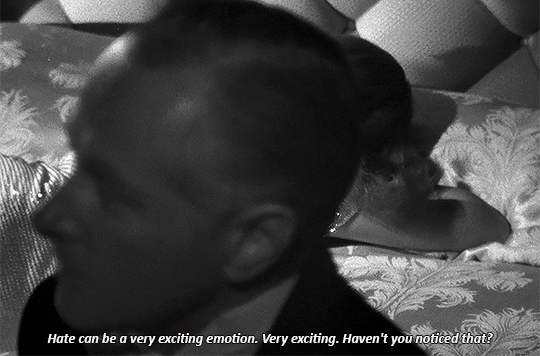
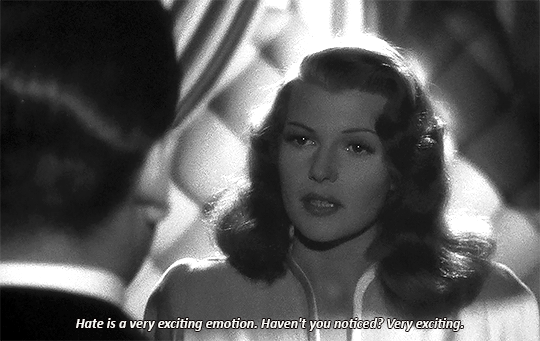
15 notes
·
View notes
Text
Yuletide!
I already screamed a lot about my amazing Cobra Kai (JOHNNY! CHARACTER STUDY!) gift, but I also wrote a bunch of stuff for Yuletide this year (assignment, pinch hits, treats). Almost all of it was related to old movies since, you know, that’s like 80% of my brain. I love Yuletide cos I get to write about my little tiny niche interests and it makes at least one other person happy. That’s awesome.
To My Spouse, Cary → Eventually, Cary Grant and Randolph Scott just stopped bothering to lie about their relationship. (Randolph Scott/Cary Grant, Old Hollywood RPF)
Francine, as told to her therapist on Long Island. → Francine met Reggie when she was seventeen. (Slap Shot (1977))
Engraved on Our Hearts → Among a great many other things, Michael felt he was developing a new perspective on voyeurism. (Leopold Dilg/Michael Lightcap/Nora Shelley, The Talk of the Town (1941))
The Girl That Casts Her Own Spells → One upon a time, there was a girl named Gilda. (Ballin Mundson/Gilda Mundson Farrell, Johnny Farrell/Gilda Mundson Farrell, Gilda Mundson Farrell/Other(s), Gilda (1946))
Bitter Turns to Sugar → AND THEY WERE SOULMATES. (Steve Leech/James McKay, The Big Country (1958))
Angels Sing → Here’s what you need to know: The Endless Summer (1966) is a surfing documentary shot in 1963 and 1964; it’s widely considered the greatest surfing movie ever made. Directed by Bruce Brown, its central story is of a round-the-world(ish) surfing trip taken by Brown himself, Robert August, and Mike Hynson. Robert graduated from high school a few months before the trip began; when it started he was 18, while Mike was 21.This is what happened between the moments depicted in the movie. Maybe. (Mike Hynson & Robert August, Surfing RPF, The Endless Summer (1966))
(Thank you, pandemic, for getting me writing again.)
#yuletide#cobra kai#gilda#slap shot#the talk of the town#the big country#cary grant#randolph scott#fanfic#stuff wot I wrote
8 notes
·
View notes
Video
youtube
Here’s tonight’s noir, Gilda.
Johnny Farrell (Glenn Ford) is a small-time American gambler, newly arrived in Buenos Aires, Argentina. When he is caught cheating at a game of blackjack, Farrell manages to talk his way into a job with the casino's owner, the powerful Ballin Mundson (George Macready). The two form an uneasy partnership based off their mutual lack of scruples until Mundson introduces Farrell to his beautiful new wife, Gilda (Rita Hayworth), who just happens to be Farrell's ex-lover.
Check it out tonight on TCM @ 11pm CST or Sunday @9AM CST.
2 notes
·
View notes
Text
gilda rewatch thoughts
The sense of place, or attempts to achieve a sense of place, really struck me this time -- the carnival scene, the exteriors of Mundson’s house, the hotels. The first time I saw this film I ignored basically all action that wasn’t set within the casino, but I enjoy that aspect of the film even as it shows its age.
Hooooly shiiiiit, I also missed somehow the full impact of Gilda’s third marriage being a sham set up by Johnny and JESUS CHRIST JOHNNY WHAT IS WRONG WITH YOU
Johnny has no lips.
Ballin kind of looks like Roger Sterling. Would I read a Mad Men Gilda AU? Yes.
That painting of Mundson looking really sinister is really sexy also.
so... ballin and johnny are both cucks
also I’m mad the timeline doesn’t really work out but I’m gonna write Gilda/Terry Lennox anyway
3 notes
·
View notes
Text
Photoshop Exercise 1: Glenn Ford
Photoshop Exercise 1: Glenn Ford
Photoshop exercise of the day: sexy Glenn Ford, ass up and on his knees, about to become Ballin Mundson’s other ‘little friend’ in a port in Buenos Aires in the opening scene of GILDA. Plus bonus picture:

View On WordPress
0 notes